PHUKET: Perhaps the clearest and most thorough description of the trafficking of Rohingya and others through Thailand was released yesterday at a conference in Kuala Lumpur run by the London-based Equal Rights Trust and the Institute for Human Rights and Peace Studies Mahidol University, Bangkok (IHRP).
In a report entitled 'Equal Only in Name: the Human Rights of Stateless Rohingya in Thailand' the treatment of the Rohingya over the period since 2008 - as reported extensively by Phuketwan - is documented, along with much more.
Here are some edited excerpts. Potentially libelous statements have been removed.
Pushback, Detention and Deportation of Boat Migrants
As undocumented and stateless people, the Rohingya are compelled to cross international borders using illegal means. Measures taken by Thai authorities to deter such migration, including boat ''push-backs,'' detention and overland deportations, amount to violations of the right to liberty and security of the person and also impact on other rights including the right to life, freedom from torture, cruel, inhuman or degrading treatment or punishment, freedom of movement and the right to seek asylum.
An estimated 3,000 people made this boat trip during the 2006-2007 sailing season. This was followed by a sharp increase to approximately 6,000 in 2008-2009, when Thailand received international criticism for ''pushing back'' several boats out to sea. In addition to the fact that boats were ''pushed-back,'' some boats were stripped of their engines and the passengers were provided with only minimal food and water.
This was heavily criticised by the international community. Between December 2008 and January 2009, three push-backs occurred resulting in over 1,100 people being cast out to sea with little food and water and no working engines.
They eventually ended up in the Andaman Islands of India and in Idi Rayeuk and the Sabang Island of Indonesia; 300 were said to have died.
In the midst of international criticism over these push-backs, Thai authorities opted to detain 79 passengers (including 12 children) from a boat that arrived on January 26, 2009.
Upon arrival, the mixed group of 79 Rohingya and Bangladeshi boat passengers were jailed for a month before being transferred to the IDC in Ranong where two detainees aged 15 and 18 died in custody. In an urgent joint appeal related to this incident, four UN Special Rapporteurs and the Chairman of the UN Working Group on Arbitrary Detention stated that:
[I]n both cases, the rapid deterioration of their health may be due to the inadequacy and inefficiency of healthcare being provided to them during their detention period and particularly during the hours preceding their deaths.
The remaining detainees were eventually transferred to the IDC in Bangkok where they remained for two years. During this period, Bangladesh accepted the return of the Bangladesh nationals among the group. Finally, the remaining Rohingya were informally deported to Myanmar, across the border near Mae Sot, after which most made their way back to Thailand and on to Malaysia through the services of smuggling networks. Following is an account of one of the detainees:
We took a boat from Maungdaw; the boat started in Bangladesh. The engine broke while still in Burma's waters and we were beaten by the Burmese military for five days and then left floating. The Burmese Navy found us and towed us for one day and night towards Thai waters and left us floating.
The boat began to sink near Thailand, and we saw a group of Thai fisherman and asked for help. They towed us for 4-5 hours and then cut the tow rope.
We saw a plane and signalled to it; the plane notified Thai security and a Thai Navy boat came to tow us to shore. We had sailed for 28 days total, from Maungdaw to Thailand.
Everyone had serious injuries from being beaten by the Burmese Navy. The Thai Navy sent some of us to the hospital and some to the police.
Those without serious injuries were sent to the court and held in jail for 5 days, then back to the detention centre. Two people died in detention.
We were then transferred to Bangkok. Another person died in the IDC there. About thirty people were sent to Bangladesh after the Bangladeshi government accepted them.
We stayed in the IDC for two years. The food was regular but not good quality. We all slept in one big room. We could only exercise once every two weeks.
Some wanted to go to a third country, including me, and some wanted to be sent back to Burma. We were never informed about what would happen to us and never knew what was going on.
One day when we were taken outside for exercise we protested. We said they could kill us, but we wouldn't stay any longer. The IDC officers called senior level officials.
The senior officer, a new officer, said he didn't know about our case. He said they could release us in one month but we demanded sooner and finally agreed to two weeks.
We were released in three groups, one per week, and driven to Myawaddy and dropped off in Democratic Karen Buddhist Army (DKBA) controlled territory.
Each person paid brokers in the DKBA 3,500 baht and they gave 500 to Thai immigration officers. The payment was to return to Mae Sot in Thailand.
After we paid we could go where we wanted. Some stayed in Mae Sot and most eventually went to Malaysia, some went to Khon Kaen, and three ended up in China.
I tried to go back to Burma with three others but we were caught and arrested and beaten by the Burmese military. They put us in jail for a night and then released us and told us never to come back or we would be killed.
We were taken by motorbike to near Myawaddy, then crossed the river and came back to Thailand.
Subsequent years have seen more boats arriving and varying policies related to ''push-back'' and land deportation being implemented.
In 2009 and 2010, only one boat was intercepted in Thai waters. In March 2010, this boat, carrying 93 people, was pushed back.
However, this time they were given food rations and eventually reached Malaysia. In January and February 2011, four boats were again intercepted in Thai waters.
After being detained a few days in Thailand, 91 passengers from one boat were forced onto another engineless boat, towed out to the high seas and set adrift. They were ultimately rescued in the Andaman Islands of India.
Another boat with 129 aboard had its engine disabled at sea by Thai authorities and drifted to Aceh in Indonesia. The other two boatloads of passengers were detained in Thai IDCs and were informally deported in Ranong in August 2011.
A Thai official stated that:
Although it's against humanitarian grounds, the illegal entry of foreigners must come under the (Thai) legal framework. This is to prevent a similar problem from occurring again in future.
Subsequently, the UN Committee on the Elimination of Racial Discrimination expressed concern over push-backs [Phuketwan deletion] and urged the government to prevent any further expulsion of Rohingya asylum seekers.
As a new sailing season started in late September 2011, the Thai government started implementing a ''help on'' policy. Officially this policy involved providing some humanitarian assistance to boats intercepted in Thai waters and allowing them to continue to their destination (Malaysia).
However, in reality, many intercepted boats were brought ashore by Thai authorities and immediately transferred to smugglers working in collusion with them for transportation across land borders.
By March 2012, the number of recorded boat arrivals had increased again. Reportedly, 2,490 boat people were arrested near Ranong and Phang Nga and another 2,552 people in 25 boats were ''helped on'' to destinations outside of Thailand.
In reality, those boats were not ''helped on'' in the sea, but the people on them were handed over to brokers to transport them across land to Malaysia, during which process they were detained in jungle camps along the Thailand-Malaysia border.
Those arrested were informally deported through land crossings to Myanmar, where they could pay brokers to be taken to Malaysia through the same overland process.
On February 7, 2013, the Thai government reported that 5,899 Rohingya had arrived since October 2012, but many more are believed to have boarded boats to Thailand from Bangladesh and Myanmar during this time.
Over the course of 2013 and early 2014, there have been noticeable changes in the demographics of new Rohingya arrivals, with increasing numbers of women and children now making the journey.
It is estimated that women and children make up between 5 to 15 percent of passengers overall. This includes a growing number of unaccompanied minors.
Although reasons for this change are numerous, it is likely to have been influenced by the increasing violence in Rakhine state, resulting in women leaving to reunite with their husbands already in Malaysia.
Additionally, there have been a number of women and a smaller number of child brides who have arrived by boat through Thailand to enter into marriages arranged by their parents or future husbands, with the latter often paying for their journey to Malaysia.
With the increasing number of women making this journey, there have been reports of incidences of rape on board these vessels.
On 10 and 11 January 2013, Thai security forces conducted raids in at least three brokers' camps and warehouses, and arrested about 1,000 Rohingya detained there by smugglers.
At the same time, Thai authorities intercepted all new boats found in Thai waters and arrested another 1,000 individuals. These 2,000 arrestees were then detained in various IDCs and shelters across Thailand.
On 28 January 2013, the Thai government declared that the 2,000 detainees would be allowed to remain in Thailand (in detention) for six months and also that no new boats would be allowed in from that day.
In February 2013, boats continued to enter Thai waters and were immediately pushed back: 11 boats ended up in Malaysia where they were intercepted by Malaysian Maritime Marine Agency, two were ultimately rescued in Sri Lanka (after 98 died aboard of starvation) and at least one landed in Aceh.
As the push-backs became an international issue, overland transfer to brokers' camps on Thai mainland had restarted by late February 2013.
Conditions in government-run shelters housing women and children have been found to be reasonably satisfactory, with outdoor spaces and enough room to move around.
However, conditions in IDCs housing men are much worse. Reports from one such centre in Phang Nga have shown 276 men, crammed in two cage-like cells designed to hold only 15 people.
The detainees claimed that during a period of five months of detention, they had not been let outside. Eight Rohingya died of health-related problems due to detention conditions.
The separation of all men from women and children has resulted in families struggling with greater uncertainty about their future.
From the perspective of the Thai officials, they are obligated to arrest and detain the Rohingya under the current Immigration Law.
Given the obligation to not refoule Rohingya to Myanmar where they are vulnerable to persecution, irrespective of the likely refusal of Myanmar to accept Rohingya returnees, and given the alternative prospect of detention in Thailand, it is likely that some Thai officials feel that the most humane course of action is to unofficially allow Rohingya to travel onto Malaysia, whereas others may financially benefit from the process.
However, as the testimonies in this report indicate, in addition to being a violation of international law, such informal solutions add to the vulnerability of Rohingya refugees and place them directly in the hands of human smugglers, where their situation may, in some cases, evolve into human trafficking.
The conundrum for Thai authorities noted above highlights the failure of the Thai legal framework, which does not adequately protect refugees, asylum seekers and stateless persons in a migration context and does not provide a viable alternative to the prolonged detention of Rohingya in Thailand.
The prosecution-focused anti-trafficking framework has not been effectively implemented. In particular, the elements that should protect victims of trafficking, who may also be refugees, are not applied in the situation relating to fleeing Rohingya.
This highlights the need for a strong regional protection based solution for the Rohingya.
As described above, the smuggling of Rohingya boat migrants across the Thailand-Malaysia land border, often involving cooperation between Thai authorities and smugglers, occurred frequently during the 2012-2013 sailing season.
While such practices are likely to have been happening prior to 2012, the media spotlight on the situation after 2012 has resulted in increased reporting of it.
Such practices result in various human rights violations, including of the right to liberty and security of the person, the right to freedom from torture, cruel, inhuman or degrading treatment or punishment, the right to seek asylum, the right to freedom of movement, and the right to life on both sides of the border, as the following account indicates:
After we landed in Thailand, we were brought to the jungle. I stayed in a big hut for five days. People told me ''this is Thailand''. Otherwise, I would not have known where I was.
I think I stayed with Thai people. When I told them that I could not pay money to them, they sent me to a place in Malaysia. In Thailand they didn't beat me. But I did not have enough food - only one meal per day.
On my third day in Malaysia, they started to beat me. They beat me every morning and every night.
They used a big stick and kicked me with boots. [He shows the scars on his back and ankles]. I was there for eight days in total. One time they pushed me. I fell to the floor.
They dragged me because I could not contact a relative in Malaysia to pay for the trip. I fell unconscious. I don't know exactly what happened. That is where the scars on my face came from. I also got a big cut in my head. Now I have stitches in it.
One man took me to the clinic. I don't know who he was. I think he was a Malay man, but I don't know if he was one of the guards or another person. After they stitched it, the same man took me back to the place in the jungle.
That place in the jungle had a zinc fence around it to stop us from leaving. The guards had pistols. There were four of them minding the camp. They had big boots to kick us with and sticks to beat us. There were about 20-30 of us.
We were all Rohingya. [When asked how he got out, his relative takes over explaining]
Relative: I received a phone call from a Malay man. He told me, ''your relative is already dead. You have to come and pick up his body,'' so I went to Tanah Merah. From there I was taken into the jungle. I was told I have to pay 5500 RM. Then I brought him back with me to KL. I don't know why the traffickers told me he was dead.
It is a big problem for me. I had to borrow money from friends to pay the brokers. The brokers wait for maximum 4-5 days to get their money. We worry that if people cannot pay, they will send them to the fishing boats in Thailand to work. I had to pay for the other brother too.
They don't have any other relatives. I don't know what to do about the third brother. They called me from Thailand just yesterday and told me I need to pay money for him too.
Deportation back to Myanmar (from where Rohingya are smuggled/trafficked to Malaysia), whether as a result of a judicial process or not, violates the principle of non-refoulement. In addition, many Rohingya who have been pushed to sea have faced threats to their right to life.
Smuggling and Trafficking of New Boat Arrivals
Thailand has long been a source, destination, and transit country for victims of trafficking who are commonly exploited by the sex industry, the commercial fishing industry, plantations, low-end garment production factories and as domestic workers.
The Malaysia-Thailand border has been a hot-spot for smuggling and trafficking in both directions, and the Rohingya have been subject to both practices. In 2009, the United States Senate Committee on Foreign Relations reported that ''a few thousand'' migrants from Myanmar, including Rohingya, had been taken from detention centres in Malaysia to southern Thailand and forced to pay smuggling fees to return to Malaysia or be sold to Thai fishing boats as bonded laborers.
Based on testimonies of those among the nearly 800 Rohingya discovered during Thai government raids on smuggling camps in Songkhla province near the Thailand-Malaysia border, it is evident that some Rohingya may have been transported through Thailand for the purpose of exploitation - most notably those who end up in forced labor or slavery-like situations - and thus, would fit the international definition of trafficked persons.
The full report is available at
http://www.equalrightstrust.org/newsstory171014/index.htm
Declaration of Interest: In July next year, Phuketwan journalists Alan Morison and Chutima Sidasathian face a continuing trial over criminal defamation and Computer Crimes Act charges brought by the Royal Thai Navy, citing a 41-word paragraph from a Pulitzer prize-winning Reuters report on the Rohingya boatpeople. Reuters and other news organisations in Thailand that published the same paragraph have not been charged. The charges were laid before the military takeover in Thailand.
In a report entitled 'Equal Only in Name: the Human Rights of Stateless Rohingya in Thailand' the treatment of the Rohingya over the period since 2008 - as reported extensively by Phuketwan - is documented, along with much more.
Here are some edited excerpts. Potentially libelous statements have been removed.
Pushback, Detention and Deportation of Boat Migrants
As undocumented and stateless people, the Rohingya are compelled to cross international borders using illegal means. Measures taken by Thai authorities to deter such migration, including boat ''push-backs,'' detention and overland deportations, amount to violations of the right to liberty and security of the person and also impact on other rights including the right to life, freedom from torture, cruel, inhuman or degrading treatment or punishment, freedom of movement and the right to seek asylum.
An estimated 3,000 people made this boat trip during the 2006-2007 sailing season. This was followed by a sharp increase to approximately 6,000 in 2008-2009, when Thailand received international criticism for ''pushing back'' several boats out to sea. In addition to the fact that boats were ''pushed-back,'' some boats were stripped of their engines and the passengers were provided with only minimal food and water.
This was heavily criticised by the international community. Between December 2008 and January 2009, three push-backs occurred resulting in over 1,100 people being cast out to sea with little food and water and no working engines.
They eventually ended up in the Andaman Islands of India and in Idi Rayeuk and the Sabang Island of Indonesia; 300 were said to have died.
In the midst of international criticism over these push-backs, Thai authorities opted to detain 79 passengers (including 12 children) from a boat that arrived on January 26, 2009.
Upon arrival, the mixed group of 79 Rohingya and Bangladeshi boat passengers were jailed for a month before being transferred to the IDC in Ranong where two detainees aged 15 and 18 died in custody. In an urgent joint appeal related to this incident, four UN Special Rapporteurs and the Chairman of the UN Working Group on Arbitrary Detention stated that:
[I]n both cases, the rapid deterioration of their health may be due to the inadequacy and inefficiency of healthcare being provided to them during their detention period and particularly during the hours preceding their deaths.
The remaining detainees were eventually transferred to the IDC in Bangkok where they remained for two years. During this period, Bangladesh accepted the return of the Bangladesh nationals among the group. Finally, the remaining Rohingya were informally deported to Myanmar, across the border near Mae Sot, after which most made their way back to Thailand and on to Malaysia through the services of smuggling networks. Following is an account of one of the detainees:
We took a boat from Maungdaw; the boat started in Bangladesh. The engine broke while still in Burma's waters and we were beaten by the Burmese military for five days and then left floating. The Burmese Navy found us and towed us for one day and night towards Thai waters and left us floating.
The boat began to sink near Thailand, and we saw a group of Thai fisherman and asked for help. They towed us for 4-5 hours and then cut the tow rope.
We saw a plane and signalled to it; the plane notified Thai security and a Thai Navy boat came to tow us to shore. We had sailed for 28 days total, from Maungdaw to Thailand.
Everyone had serious injuries from being beaten by the Burmese Navy. The Thai Navy sent some of us to the hospital and some to the police.
Those without serious injuries were sent to the court and held in jail for 5 days, then back to the detention centre. Two people died in detention.
We were then transferred to Bangkok. Another person died in the IDC there. About thirty people were sent to Bangladesh after the Bangladeshi government accepted them.
We stayed in the IDC for two years. The food was regular but not good quality. We all slept in one big room. We could only exercise once every two weeks.
Some wanted to go to a third country, including me, and some wanted to be sent back to Burma. We were never informed about what would happen to us and never knew what was going on.
One day when we were taken outside for exercise we protested. We said they could kill us, but we wouldn't stay any longer. The IDC officers called senior level officials.
The senior officer, a new officer, said he didn't know about our case. He said they could release us in one month but we demanded sooner and finally agreed to two weeks.
We were released in three groups, one per week, and driven to Myawaddy and dropped off in Democratic Karen Buddhist Army (DKBA) controlled territory.
Each person paid brokers in the DKBA 3,500 baht and they gave 500 to Thai immigration officers. The payment was to return to Mae Sot in Thailand.
After we paid we could go where we wanted. Some stayed in Mae Sot and most eventually went to Malaysia, some went to Khon Kaen, and three ended up in China.
I tried to go back to Burma with three others but we were caught and arrested and beaten by the Burmese military. They put us in jail for a night and then released us and told us never to come back or we would be killed.
We were taken by motorbike to near Myawaddy, then crossed the river and came back to Thailand.
Subsequent years have seen more boats arriving and varying policies related to ''push-back'' and land deportation being implemented.
In 2009 and 2010, only one boat was intercepted in Thai waters. In March 2010, this boat, carrying 93 people, was pushed back.
However, this time they were given food rations and eventually reached Malaysia. In January and February 2011, four boats were again intercepted in Thai waters.
After being detained a few days in Thailand, 91 passengers from one boat were forced onto another engineless boat, towed out to the high seas and set adrift. They were ultimately rescued in the Andaman Islands of India.
Another boat with 129 aboard had its engine disabled at sea by Thai authorities and drifted to Aceh in Indonesia. The other two boatloads of passengers were detained in Thai IDCs and were informally deported in Ranong in August 2011.
A Thai official stated that:
Although it's against humanitarian grounds, the illegal entry of foreigners must come under the (Thai) legal framework. This is to prevent a similar problem from occurring again in future.
Subsequently, the UN Committee on the Elimination of Racial Discrimination expressed concern over push-backs [Phuketwan deletion] and urged the government to prevent any further expulsion of Rohingya asylum seekers.
As a new sailing season started in late September 2011, the Thai government started implementing a ''help on'' policy. Officially this policy involved providing some humanitarian assistance to boats intercepted in Thai waters and allowing them to continue to their destination (Malaysia).
However, in reality, many intercepted boats were brought ashore by Thai authorities and immediately transferred to smugglers working in collusion with them for transportation across land borders.
By March 2012, the number of recorded boat arrivals had increased again. Reportedly, 2,490 boat people were arrested near Ranong and Phang Nga and another 2,552 people in 25 boats were ''helped on'' to destinations outside of Thailand.
In reality, those boats were not ''helped on'' in the sea, but the people on them were handed over to brokers to transport them across land to Malaysia, during which process they were detained in jungle camps along the Thailand-Malaysia border.
Those arrested were informally deported through land crossings to Myanmar, where they could pay brokers to be taken to Malaysia through the same overland process.
On February 7, 2013, the Thai government reported that 5,899 Rohingya had arrived since October 2012, but many more are believed to have boarded boats to Thailand from Bangladesh and Myanmar during this time.
Over the course of 2013 and early 2014, there have been noticeable changes in the demographics of new Rohingya arrivals, with increasing numbers of women and children now making the journey.
It is estimated that women and children make up between 5 to 15 percent of passengers overall. This includes a growing number of unaccompanied minors.
Although reasons for this change are numerous, it is likely to have been influenced by the increasing violence in Rakhine state, resulting in women leaving to reunite with their husbands already in Malaysia.
Additionally, there have been a number of women and a smaller number of child brides who have arrived by boat through Thailand to enter into marriages arranged by their parents or future husbands, with the latter often paying for their journey to Malaysia.
With the increasing number of women making this journey, there have been reports of incidences of rape on board these vessels.
On 10 and 11 January 2013, Thai security forces conducted raids in at least three brokers' camps and warehouses, and arrested about 1,000 Rohingya detained there by smugglers.
At the same time, Thai authorities intercepted all new boats found in Thai waters and arrested another 1,000 individuals. These 2,000 arrestees were then detained in various IDCs and shelters across Thailand.
On 28 January 2013, the Thai government declared that the 2,000 detainees would be allowed to remain in Thailand (in detention) for six months and also that no new boats would be allowed in from that day.
In February 2013, boats continued to enter Thai waters and were immediately pushed back: 11 boats ended up in Malaysia where they were intercepted by Malaysian Maritime Marine Agency, two were ultimately rescued in Sri Lanka (after 98 died aboard of starvation) and at least one landed in Aceh.
As the push-backs became an international issue, overland transfer to brokers' camps on Thai mainland had restarted by late February 2013.
Conditions in government-run shelters housing women and children have been found to be reasonably satisfactory, with outdoor spaces and enough room to move around.
However, conditions in IDCs housing men are much worse. Reports from one such centre in Phang Nga have shown 276 men, crammed in two cage-like cells designed to hold only 15 people.
The detainees claimed that during a period of five months of detention, they had not been let outside. Eight Rohingya died of health-related problems due to detention conditions.
The separation of all men from women and children has resulted in families struggling with greater uncertainty about their future.
From the perspective of the Thai officials, they are obligated to arrest and detain the Rohingya under the current Immigration Law.
Given the obligation to not refoule Rohingya to Myanmar where they are vulnerable to persecution, irrespective of the likely refusal of Myanmar to accept Rohingya returnees, and given the alternative prospect of detention in Thailand, it is likely that some Thai officials feel that the most humane course of action is to unofficially allow Rohingya to travel onto Malaysia, whereas others may financially benefit from the process.
However, as the testimonies in this report indicate, in addition to being a violation of international law, such informal solutions add to the vulnerability of Rohingya refugees and place them directly in the hands of human smugglers, where their situation may, in some cases, evolve into human trafficking.
The conundrum for Thai authorities noted above highlights the failure of the Thai legal framework, which does not adequately protect refugees, asylum seekers and stateless persons in a migration context and does not provide a viable alternative to the prolonged detention of Rohingya in Thailand.
The prosecution-focused anti-trafficking framework has not been effectively implemented. In particular, the elements that should protect victims of trafficking, who may also be refugees, are not applied in the situation relating to fleeing Rohingya.
This highlights the need for a strong regional protection based solution for the Rohingya.
As described above, the smuggling of Rohingya boat migrants across the Thailand-Malaysia land border, often involving cooperation between Thai authorities and smugglers, occurred frequently during the 2012-2013 sailing season.
While such practices are likely to have been happening prior to 2012, the media spotlight on the situation after 2012 has resulted in increased reporting of it.
Such practices result in various human rights violations, including of the right to liberty and security of the person, the right to freedom from torture, cruel, inhuman or degrading treatment or punishment, the right to seek asylum, the right to freedom of movement, and the right to life on both sides of the border, as the following account indicates:
After we landed in Thailand, we were brought to the jungle. I stayed in a big hut for five days. People told me ''this is Thailand''. Otherwise, I would not have known where I was.
I think I stayed with Thai people. When I told them that I could not pay money to them, they sent me to a place in Malaysia. In Thailand they didn't beat me. But I did not have enough food - only one meal per day.
On my third day in Malaysia, they started to beat me. They beat me every morning and every night.
They used a big stick and kicked me with boots. [He shows the scars on his back and ankles]. I was there for eight days in total. One time they pushed me. I fell to the floor.
They dragged me because I could not contact a relative in Malaysia to pay for the trip. I fell unconscious. I don't know exactly what happened. That is where the scars on my face came from. I also got a big cut in my head. Now I have stitches in it.
One man took me to the clinic. I don't know who he was. I think he was a Malay man, but I don't know if he was one of the guards or another person. After they stitched it, the same man took me back to the place in the jungle.
That place in the jungle had a zinc fence around it to stop us from leaving. The guards had pistols. There were four of them minding the camp. They had big boots to kick us with and sticks to beat us. There were about 20-30 of us.
We were all Rohingya. [When asked how he got out, his relative takes over explaining]
Relative: I received a phone call from a Malay man. He told me, ''your relative is already dead. You have to come and pick up his body,'' so I went to Tanah Merah. From there I was taken into the jungle. I was told I have to pay 5500 RM. Then I brought him back with me to KL. I don't know why the traffickers told me he was dead.
It is a big problem for me. I had to borrow money from friends to pay the brokers. The brokers wait for maximum 4-5 days to get their money. We worry that if people cannot pay, they will send them to the fishing boats in Thailand to work. I had to pay for the other brother too.
They don't have any other relatives. I don't know what to do about the third brother. They called me from Thailand just yesterday and told me I need to pay money for him too.
Deportation back to Myanmar (from where Rohingya are smuggled/trafficked to Malaysia), whether as a result of a judicial process or not, violates the principle of non-refoulement. In addition, many Rohingya who have been pushed to sea have faced threats to their right to life.
Smuggling and Trafficking of New Boat Arrivals
Thailand has long been a source, destination, and transit country for victims of trafficking who are commonly exploited by the sex industry, the commercial fishing industry, plantations, low-end garment production factories and as domestic workers.
The Malaysia-Thailand border has been a hot-spot for smuggling and trafficking in both directions, and the Rohingya have been subject to both practices. In 2009, the United States Senate Committee on Foreign Relations reported that ''a few thousand'' migrants from Myanmar, including Rohingya, had been taken from detention centres in Malaysia to southern Thailand and forced to pay smuggling fees to return to Malaysia or be sold to Thai fishing boats as bonded laborers.
Based on testimonies of those among the nearly 800 Rohingya discovered during Thai government raids on smuggling camps in Songkhla province near the Thailand-Malaysia border, it is evident that some Rohingya may have been transported through Thailand for the purpose of exploitation - most notably those who end up in forced labor or slavery-like situations - and thus, would fit the international definition of trafficked persons.
The full report is available at
http://www.equalrightstrust.org/newsstory171014/index.htm
Declaration of Interest: In July next year, Phuketwan journalists Alan Morison and Chutima Sidasathian face a continuing trial over criminal defamation and Computer Crimes Act charges brought by the Royal Thai Navy, citing a 41-word paragraph from a Pulitzer prize-winning Reuters report on the Rohingya boatpeople. Reuters and other news organisations in Thailand that published the same paragraph have not been charged. The charges were laid before the military takeover in Thailand.

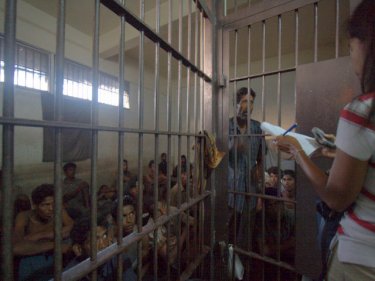





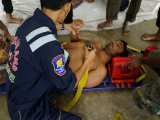
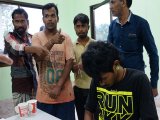
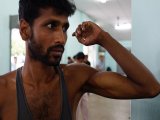

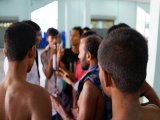
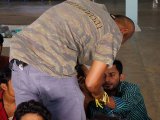
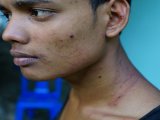

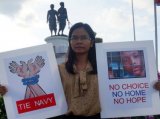
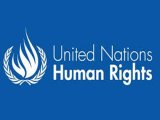

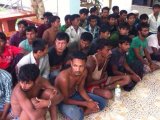



So sad. These people seem to have no advocates.
Posted by Nomadjoe on October 18, 2014 23:20